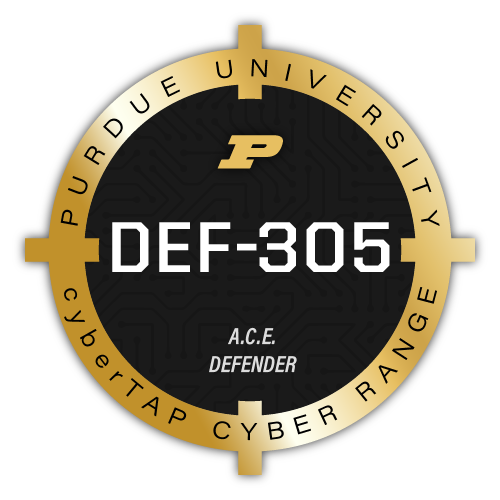
Defender 305: Network Forensics
- Duration: 16 hours
- Delivery Options: Online, In-person, Hybrid
Finish key learning objectives of defensive security concepts including advanced Linux and Windows forensics and logging, reverse engineering techniques. Key concepts and tools include commercials SIEMs and firewalls, and other investigation tools.
Who should take this course
DEF-305 is designed for cyber and information security professionals looking to improve their defensive skills. It is recommended that participants have at least three to five years of cybersecurity experience or completed the previous DEF series courses.
How can you take this course
Online
Available online live with an instructor
In-person
Available in-person either at Purdue or at your location.
Hybrid
Available as a combination of online and in-person
What tools you will use
Participants will use industry tools such as Active Directory, QRadar, Palo Alto Firewalls, Zennos, SysInternals, McAfee EPO, and more.
What you can expect from Defender 305: Network Forensics
DEF-305 introduces learning to forensic and network threat-hunting techniques and tools. Participants are tasked with responding to three cyberattacks with the use of commercial investigation tools. Each participant will practice spotting indicators of compromise, identifying cyberattacks, mitigation, and recovery from an attack. The range instructor will provide a debrief with full details and more techniques on how to respond to network attacks.
Key Takeaways
For Organizations:
- Upskill current workforce
- Get hands-on with industry tools in virtual labs.
- Perfect for I.T. team expanding responsibilities
For Individuals:
- Gain an understanding of network traffic.
- Learn industry tools in virtual labs.
- Taught remotely or in-person
Training
While DEF-304 is recommended for teams, it can be taken as an individual. The course is taught through three instructor-led Purdue Cyber Range scenarios over the course of two days.
Purdue Cyber Range is a virtual testing ground that allows individuals and teams to experience both defensive and offensive cyberattack scenarios. Each scenario is overseen by a Range Master, ensuring your team's experience is as educational as possible.
Course Topics
Threat Hunting: Understand and explain threat-hunting concepts and techniques, and tools.
Incident Response: Understand the foundations of identifying, containing, and recovering from a cyber attack within a network.
Adversarial Thinking: Learn how to better identify malware and bad actors by understanding antagonistic thinking.
Tech Requirements
It is recommended that all of cyberTAP courses be taken on a laptop or PC that runs either Windows or Linux as an operating system. We also recommended to have a fast and reliable internet access.
Are you interested in learning more?
cyberTAP's comprehensive approach to teaching cyber fundamentals and building practical skills through applied technical training is perfect for those interested in starting a new career, learning a new skill, experiencing a cyberattack firsthand, or making a team around cybersecurity. Our programs are fully customizable to offer a tailored solution for individual and corporate needs. Let's get in touch and see just how cyberTAP can partner with you and develop a training program just for you and your team.



